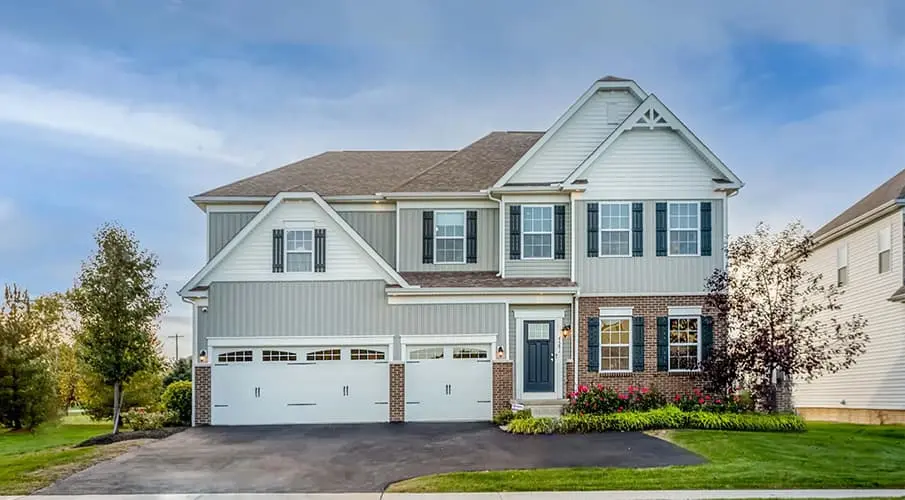Join Drake At Stake - America's Social Casino. Claim $25 Stake Cash FREE - PLAY NOW

- Keep your crypto and get liquidity.
- Compare rates and get funds in minutes.
- Use BTC, SOL, ETH, and more as security for a loan.

Rent, mortgage, or just stack sats? First-time homebuyers hit historic lows as Bitcoin exchange reserves diminish
Share
U.S. family debt just struck $18T, mortgage rates are brutal, and Bitcoin's supply crunch is intensifying. Is the old course to wealth breaking down?
Tabulation
Realty is slowing - quickly
From deficiency hedge to liquidity trap
A lot of homes, too few coins
The flippening isn't coming - it's here
Realty is slowing - fast
For years, real estate has actually been one of the most reliable methods to construct wealth. Home worths usually increase over time, and residential or commercial property ownership has long been considered a safe financial investment.
But right now, the housing market is showing indications of a slowdown unlike anything seen in years. Homes are sitting on the market longer. Sellers are cutting costs. Buyers are dealing with high mortgage rates.
According to current information, the average home is now selling for 1.8% below asking cost - the most significant discount rate in almost two years. Meanwhile, the time it requires to sell a typical home has actually stretched to 56 days, marking the longest wait in five years.
BREAKING: The average US home is now selling for 1.8% less than its asking price, the biggest discount in 2 years.
This is likewise among the most affordable readings since 2019.
It present takes approximately ~ 56 days for the common home to offer, the longest span in 5 years ... pic.twitter.com/DhULLgTPoL
In Florida, the slowdown is much more pronounced. In cities like Miami and Fort Lauderdale, over 60% of listings have remained unsold for more than two months. Some homes in the state are offering for as much as 5% listed below their market price - the steepest discount rate in the country.
At the very same time, Bitcoin (BTC) is becoming an increasingly appealing alternative for financiers seeking a limited, valuable asset.
BTC recently struck an all-time high of $109,114 before pulling back to $95,850 as of Feb. 19. Even with the dip, BTC is still up over 83% in the past year, driven by rising institutional demand.
So, as property ends up being more difficult to sell and more costly to own, could Bitcoin emerge as the ultimate shop of worth? Let's discover out.
From shortage hedge to liquidity trap
The housing market is experiencing a sharp slowdown, weighed down by high mortgage rates, inflated home costs, and declining liquidity.
The average 30-year mortgage rate stays high at 6.96%, a stark contrast to the 3%-5% rates common before the pandemic.
Meanwhile, the average U.S. home-sale rate has actually increased 4% year-over-year, but this increase hasn't equated into a more powerful market-affordability pressures have kept need suppressed.
Several key trends highlight this shift:
- The typical time for a home to go under agreement has jumped to 34 days, a sharp increase from previous years, indicating a cooling market.
- A complete 54.6% of homes are now selling below their list rate, a level not seen in years, while simply 26.5% are selling above. Sellers are significantly forced to change their expectations as purchasers get more take advantage of.
- The mean sale-to-list rate ratio has been up to 0.990, showing stronger purchaser settlements and a decrease in seller power.
Not all homes, however, are impacted equally. Properties in prime locations and move-in-ready condition continue to attract buyers, while those in less desirable locations or requiring restorations are dealing with high discount rates.
But with loaning costs rising, the housing market has actually ended up being far less liquid. Many prospective sellers hesitate to part with their low fixed-rate mortgages, while buyers struggle with greater month-to-month payments.
This absence of liquidity is a basic weakness. Unlike Bitcoin, which can be traded 24/7 with near-instant execution, property deals are slow, costly, and often take months to finalize.
As economic unpredictability lingers and capital seeks more effective shops of value, the barriers to entry and slow liquidity of realty are ending up being major drawbacks.
A lot of homes, too couple of coins
While the housing market deals with increasing stock and weakening liquidity, Bitcoin is experiencing the opposite - a supply capture that is sustaining institutional need.
Unlike genuine estate, which is influenced by debt cycles, market conditions, and continuous development that broadens supply, Bitcoin's overall supply is completely capped at 21 million.
Bitcoin's outright deficiency is now hitting surging demand, especially from institutional financiers, strengthening Bitcoin's function as a long-lasting store of worth.
The approval of area Bitcoin ETFs in early 2024 set off a massive wave of institutional inflows, drastically shifting the supply-demand balance.
Since their launch, these ETFs have actually attracted over $40 billion in net inflows, with financial giants like BlackRock, Grayscale, and Fidelity controlling most of holdings.
The need surge has taken in Bitcoin at an unmatched rate, with everyday ETF purchases ranging from 1,000 to 3,000 BTC - far surpassing the approximately 500 brand-new coins mined every day. This growing supply deficit is making Bitcoin increasingly scarce outdoors market.
At the exact same time, Bitcoin exchange reserves have actually dropped to 2.5 million BTC, the most affordable level in 3 years. More investors are withdrawing their holdings from exchanges, indicating strong conviction in Bitcoin's long-lasting possible rather than treating it as a short-term trade.
Further enhancing this pattern, long-term holders continue to dominate supply. Since December 2023, 71% of all Bitcoin had remained untouched for over a year, highlighting deep financier commitment.
While this figure has somewhat decreased to 62% as of Feb. 18, the wider trend points to Bitcoin ending up being a progressively securely held property gradually.
The flippening isn't coming - it's here
As of January 2025, the mean U.S. home-sale price stands at $350,667, with mortgage rates hovering near 7%. This combination has pushed monthly mortgage payments to record highs, making homeownership increasingly unattainable for younger generations.
To put this into viewpoint:
- A 20% down payment on a median-priced home now goes beyond $70,000-a figure that, in many cities, surpasses the overall home rate of previous decades.
- First-time homebuyers now represent simply 24% of total purchasers, a historical low compared to the long-lasting average of 40%-50%.
- Total U.S. home financial obligation has surged to $18.04 trillion, with mortgage balances accounting for 70% of the total-reflecting the growing financial concern of homeownership.
Meanwhile, Bitcoin has surpassed realty over the past years, boasting a compound annual development rate (CAGR) of 102.36% because 2011-compared to housing's 5.5% CAGR over the same duration.
But beyond returns, a deeper generational shift is unfolding. Millennials and Gen Z, raised in a digital-first world, see traditional financial systems as slow, rigid, and outdated.
The concept of owning a decentralized, borderless property like Bitcoin is even more attractive than being connected to a 30-year mortgage with unforeseeable residential or commercial property taxes, insurance coverage costs, and upkeep expenditures.
Surveys suggest that younger financiers progressively prioritize monetary versatility and mobility over homeownership. Many prefer renting and keeping their assets liquid instead of dedicating to the illiquidity of property.
Bitcoin's portability, day-and-night trading, and resistance to censorship align completely with this frame of mind.
Does this mean property is becoming obsolete? Not completely. It remains a hedge against inflation and a valuable property in high-demand locations.
But the inefficiencies of the housing market - combined with Bitcoin's growing institutional approval - are improving financial investment choices. For the very first time in history, a digital possession is competing straight with physical property as a long-lasting store of worth.









